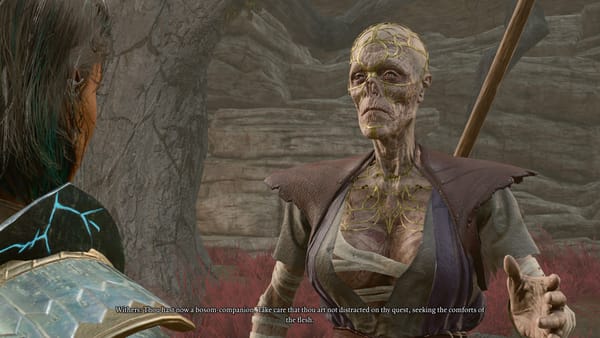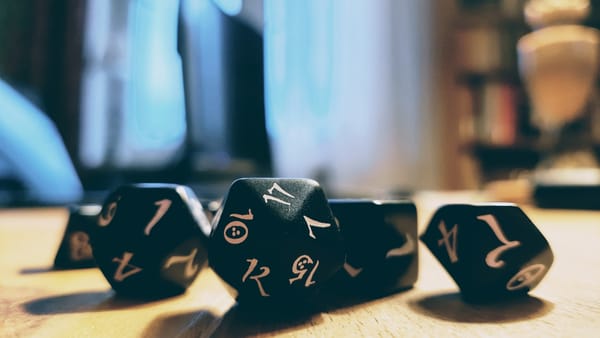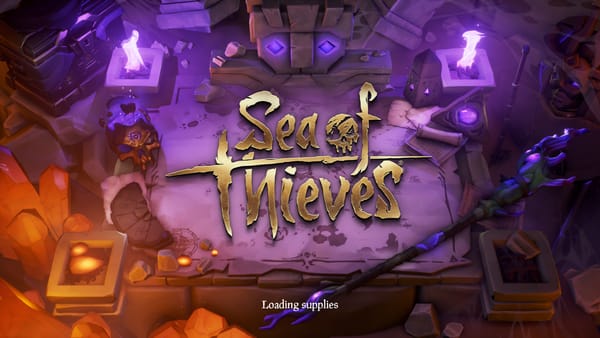What Does Difficulty Accessibility Really Mean?
And why it should be a priority for developers that want to make ultra-difficult games.
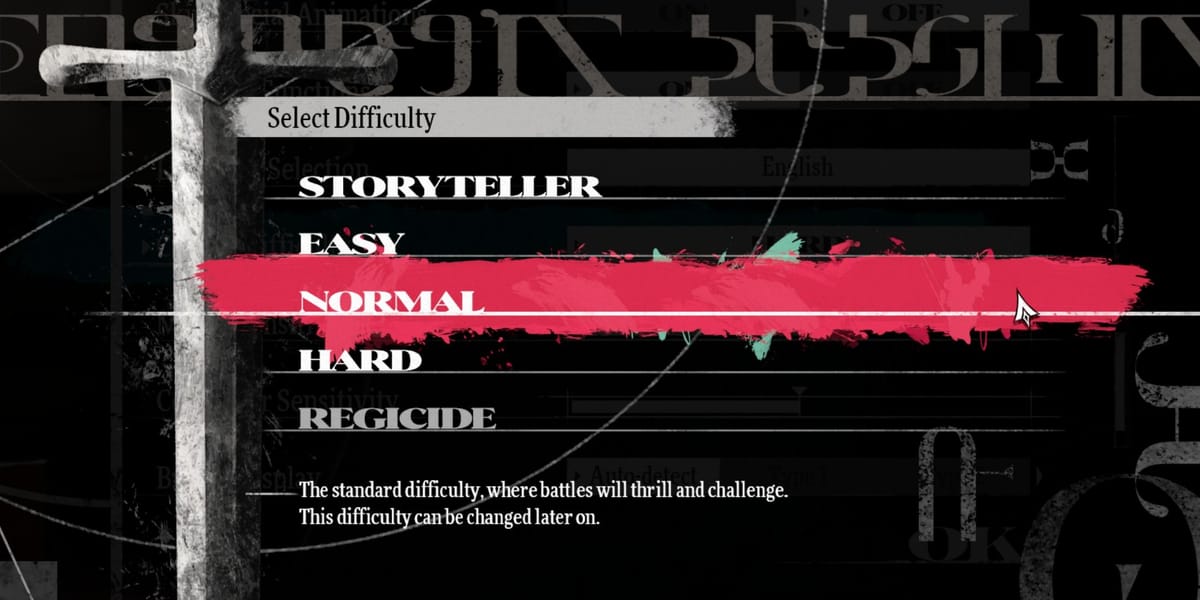
I started writing this article not long after I put out my Silksong review (see here). I continued to see people have the kind of discussion around the difficulty of the game that always happens with really popular but difficult games (including some folks on Tumblr who did not appreciate my review where I said the game should have accessibility options to lower the amount of damage you take and increase the amount of damage you do which ending up with them insulting me and saying I don't know how to have fun, as always happens on the internet). Then I found out about how both Nine Sols and Lies of P have difficulty options and I decided that I had to play those and then write about what it means to have games be accessible for more people.
So with that, today I'm gonna discuss how accessibility for difficulty is never a bad thing in games, how it is actually a good thing as it allows more people to experience the wonder and majesty of some really really good games. I'm going to talk about why people are against it and why those arguments don't hold water. I'm going to talk about what the benefit of difficulty is and how that doesn't have to be lost with these settings. And finally I'm going to give a request to the gaming community at large to be more open to new, more casual gamers playing games that are difficult (a request I know will go unheard in many spaces of the Internet).
If you have any frustrations with what I say then I'd just ask you to read through to the end because I likely address your issues. I didn't take a month to write this just because I felt like it, I did it so I could get all my thoughts together, read a lot of people's opinions on this subject, or watch peoples videos on it, and address as many points as possible. I hope you can understand.
Very Important Note: To cut this off at the top, the definition of Accessible is: Ease of access or approach. Making something more accessible is often put forward as only being about disability but that's a drastic oversimplification. Something being accessible is about allowing more people to experience or do something. Having a menu at a restaurant in multiple languages is about accessibility. Having electricity running to rural areas is about accessibility. Able-bodied folk are just as capable of benefiting from accessibility. Thus, difficulty settings or sliders is about accessibility and can be called accessibility settings. It is not disrespectful to us disabled folk to say that, it's disrespectful to say that accessibility is only for disabled folk.
Fold them in
What is so bad about casual gamers? Is there something inherently wrong with them? Why do so many people hate them? Put simply, casual gamers make up the majority of the gaming community, most people aren't able to spend hours and hours and hours every day or week pouring themselves over games that require intense attention. Instead they want to be able to relax because of a tough day or because their kids were screaming all. Damn. Day.
So why not let them join those of us who play even more games? Why deride them for having other things going on in their lives? It is, simply put, childish.
So what Id argue we need to do is simply Fold them in. But how, I hear you ask, how do you fold something in? That's not important right now. What's important is that other difficult games are getting in on this idea right fucking now by opening themselves up to more people and more developers should be learning from them instead of being stuck in the past, fueled by their game design nostalgia (oh hey, it's nostalgia, I'll write about that sometime soon).
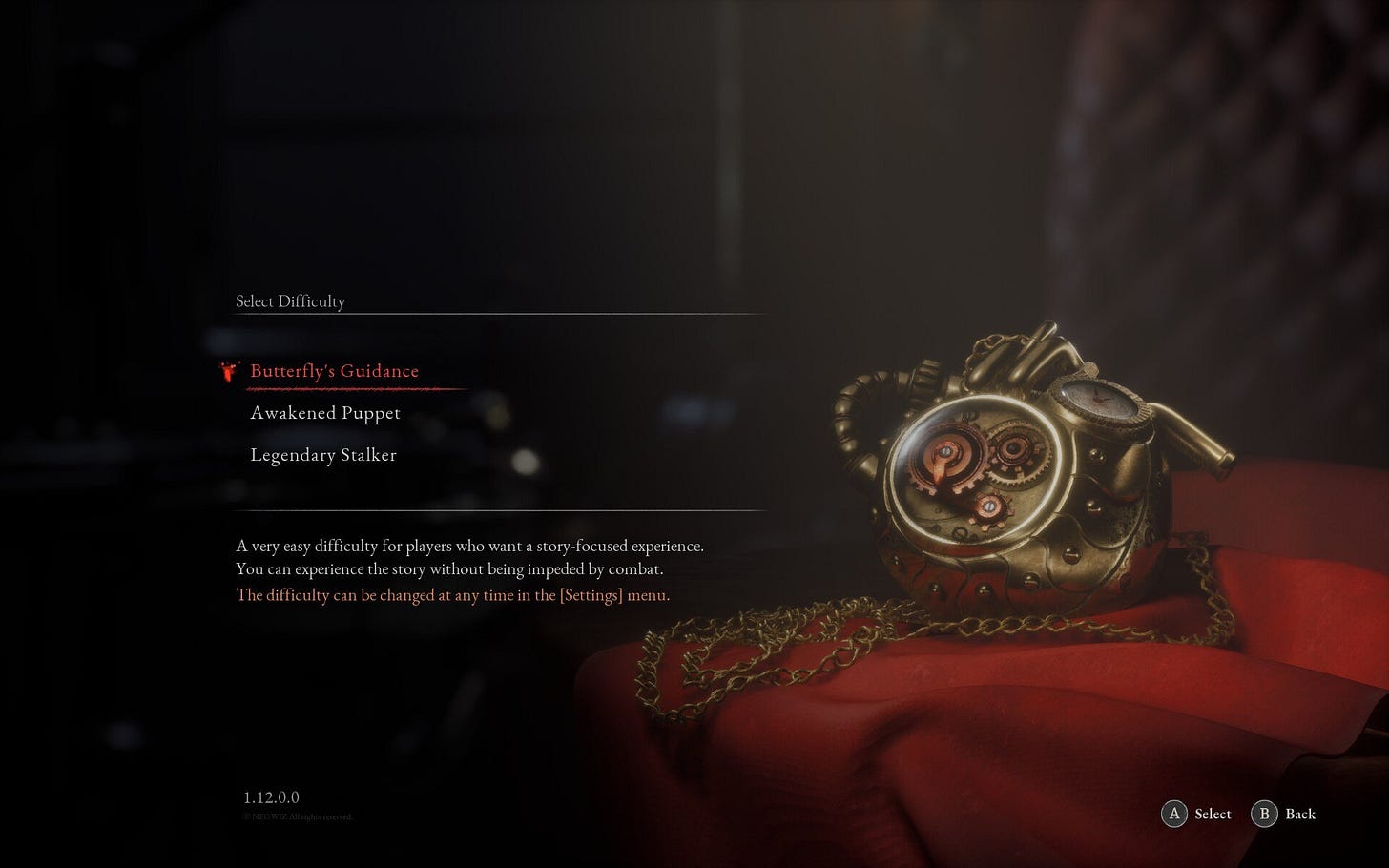
With the recent DLC, Lies of P introduced 2 brand new difficulty settings, easy and very easy. So not only did they decide that they wanted to introduce more people to their game, they went a step further and added even more options. They want as many people as possible to play their game because all developers should. The player takes much, much less damage in the very easy mode and the game goes from being filled with stress to moments of fun mixed with stress.
Then there's Celeste, which has set the Gold Standard that all games should aspire to with the Assist mode that allows players to control their experience immensely. The game is difficult as shit, but with the Assist settings tons more people were able to play it and see the wonderful journey that the developers crafted for us players. It was amazing and without that mode the game would not have made as much of a splash.
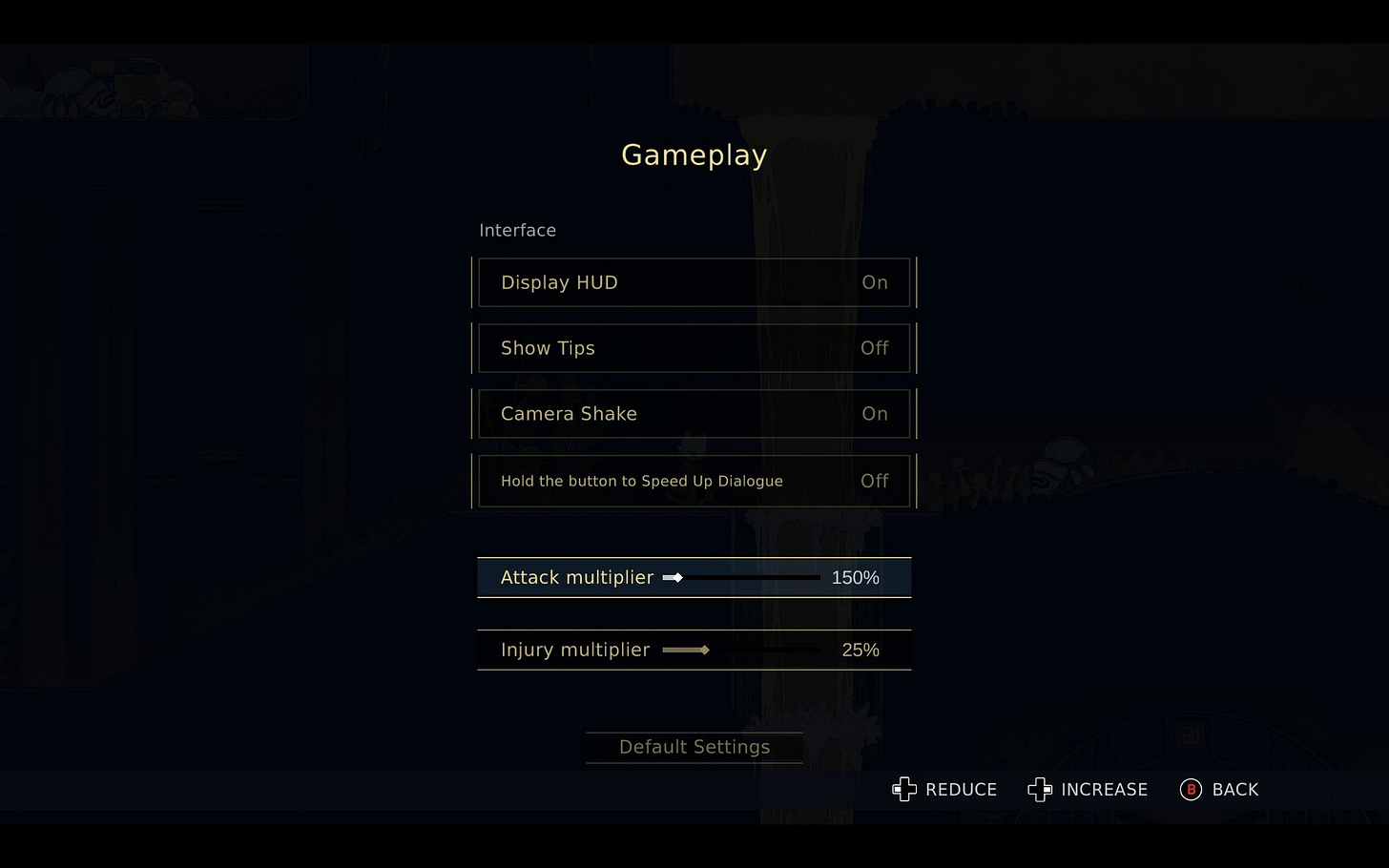
Then there's Nine Sols, another Metroidvania like Silksong, one that many many people consider to be significantly harder than it. Yet, this incredibly difficult game that relies on a parry mechanic has what Lies of P recently added as well, an easy mode (it's called Story mode). In it, they allow you to turn down how much damage you take and turn up how much damage you dish out. So a more difficult game than Silksong has difficulty settings, why can't Silksong? Why can't all difficult games?
Then there's Elden Ring. They didn't introduce an easy mode unfortunately, but they did do something that's the closest they've gotten, they introduced Ashes creatures. They provided a ton of different creatures that you can summon at will and can help you fight. Some incredibly OP and others that are constantly coming back from the dead. Ashes, while being something you can choose to use, aren't something that takes up an equipment slot that other things could be filling, they're their own thing and that allows you to use them without feeling like you're losing out on interesting builds in order to have an easier time. While the best of these ashes are behind tough bosses and you do have to find them, they're still creatures that make the game more manageable, more accessible.
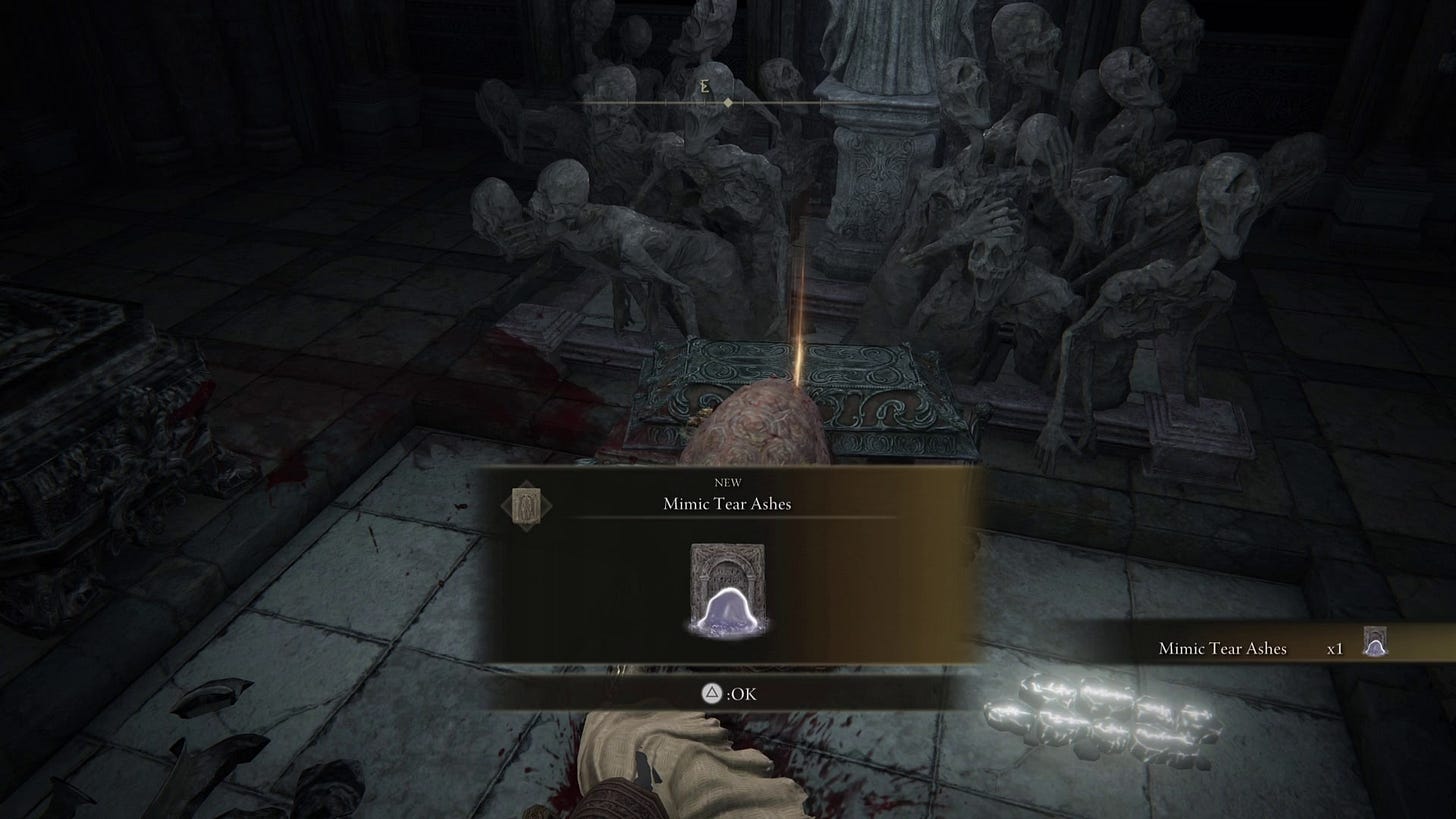
They also introduced an open world that allows you to be able to explore and grind to level up much much more easily than any prior Soulsborne game and while grinding sucks as a concept, it provides you very real benefits here that some other games don't. You're able to do more damage and take less damage. Elden Ring is the most successful a Fromsoft game has ever been. Not inherently because it was open world or because of the George R. R. Martin connection, but because it was more accessible. That's literally it. People finally were able to engage with their games who hadn't been able to. That's huge and should be the standard. Now, imagine how many people would have been able to get even farther into the game if there was an easy mode. Or how many people were still turned away by the difficulty when having an easy mode would have drawn them in.
I'm literally one of these people. Lies of P (review here) and Nine Sols (review here) are games that I've been interested in but haven't gotten because of the difficulty. As I've talked about before (as recently as my review of Gris), I have MS (a disability) and it's fucked a lot with my hands being able to act...normal. At least when it comes to playing games, I can type and use my mouse and keyboard well but controllers have always been how I've played my games. But knowing that the difficulty of these games can be messed with I hopped on that ship and have enjoyed my time with them immensely. Those developers made their games more accessible to people like me, they are treading a very rarely used path and more should follow.
Games are art
I, and many in the industry I am a part of, believe that games are an art form. Many will use this as a way to say that not all games are for everyone because not all art is for everyone. This is true...sort of.
The American painter Keith Haring once said "art is for everyone". What did he mean by that? He meant that art should be accessible for everyone. He did this by trying to put his art out there without restricting it to galleries that only some people could access.
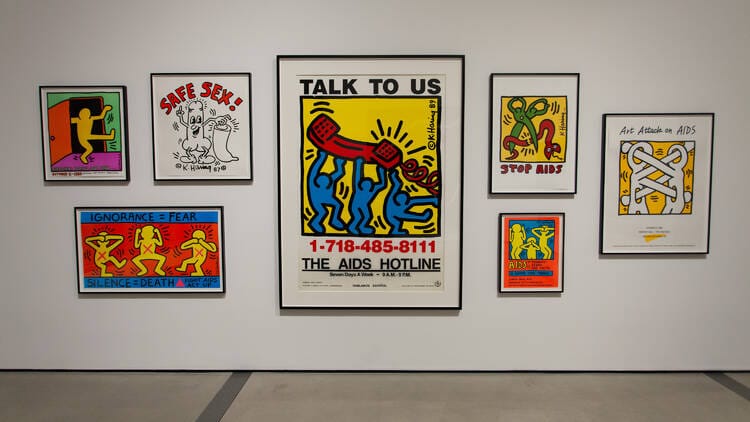
That did not mean that you would like the art you see, just that you would all have a fair and accessible way to see that art. That's what the statement "games are art" should mean. Not that you must like the artistic expression of every game but that every game should be accessible so that all have a chance to try the game in the way they are able and so they are theoretically able to play it to the end as well.
Right now super difficult games are segmented off in "galleries" that people can only access if they "git gud". If you try to enter and run into a roadblock, like a really steep ramp, then people just tell you to leave and that this gallery just isn't for you. They say that, if you can't climb the ramp then you're just not learning the way to climb the ramp, but ignoring that you're missing the needed dexterity to climb it or that you don't have the time or the hours and hours it takes to learn how to climb the ramp or that you simply have to climb a steep ramp in the rest of your life and don't want to have to climb a steep ramp at a gallery of something you want to enjoy. They'll even say "there's nothing to be ashamed of" about any of the above reasons while also holding themselves as better than others because they were able to climb that ramp.
Adding accessibility options to make the game easier, either through the framing of difficulty modes or just assist mode accessibility settings, e.g. Celeste, is allowing the "art is for everyone" idea to hold weight. It adds a smoother ramp for those that want to see the art without as much struggle as those going up the really steep one (while keeping the steep one intact for those that want to go through that). It still goes to the same place just as a much more gradual experience.
It allows people to play games that they would otherwise not be able to, even if they had wanted to. It opens up the community of games to be more varied and diverse and have more of a wide reach. For instance, Silksong is an absolutely beautiful game with rich lore, a kickass combat system, and a wonderful world to explore. But because it has a very steep difficulty curve and very high skill floor, the game is so difficult that many many have decided to give up on it, or not even play it, despite being super into the original. The game is purposefully harder than the original because the developers seemed to approach it from the point of view of the people who played the hardest parts of the first one, even saying they had to make the game harder because the player base is just better at the game now, as opposed to those that played the game and enjoyed it without completing the most difficult sections.
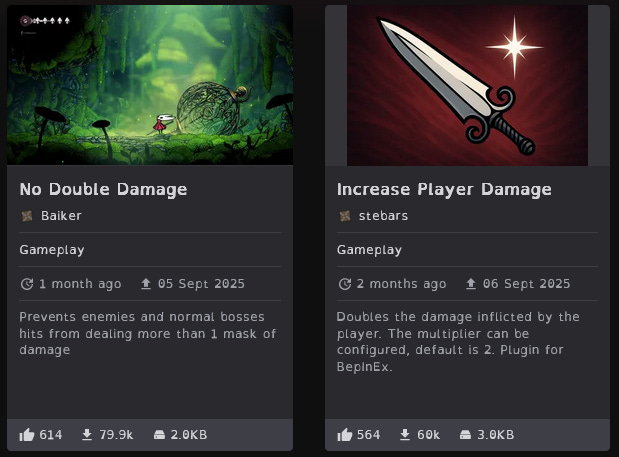
Silksong deserves to be played by more fresh faces but right now, with how the game is, that's incredibly difficult. Mods exist for the PC version but not for the others. Team Cherry made art. Beautiful and detailed art that deserves to be appreciated by all, why segment it into a gallery with a 80 degree entry ramp? Why not approach it like the ideal of being an artist and make it accessible to everyone even if people end up not jiving with the type of game it is (whether that be themes wise, combat style wise, or even just because it's a 2D platformer).
Artistic Vision
Going off my prior point, people argue that adding these options would violate the artistic vision of the developer. That it was their intention to create a level playing field for all players and we should respect that. But does making "art for everyone" change the artistic vision? All it does is allow it to be more accessible (through options) so people can see if they enjoy it.
If I made a painting that is only supposed to be experienced in a gallery that is at the top of a mountain, is that reasonable? To filter out people who would likely enjoy it if I just made the art able to be seen by all outside of a gallery OR at the top of a mountain? No. Or if I wrote a book in Latin, a very difficult language to learn, should I not allow translations (or translate it myself) because the artistic vision of mine would be violated? No, that'd be stupid.

But wait, artistic vision is a thing, just only in specific ways. I fundamentally believe that the idea of "art is for everyone" is only for allowing people to have the option to be able to experience the art in an accessible fashion. It does not mean changing the art style, changing the story, the themes, the representation, the world, even the standard mode. Those things are impossible to separate from the experience, but making a game more accessible is not the same thing.
Accessibility settings are not meant to make a game that everyone loves, you can't win over everyone. It's meant to stop gatekeeping and make it capable of being played by everyone if they want to try it out.
Put simply, artistic vision should not be a method of purposefully excluding others because it makes one feel superior. Artistic Vision is not a reasonable defense for excluding more casual gamers if all that they would need to play the game is simply a difficulty slider. That is pure elitism from the developers and from the community. Which, speaking of...
Elitism will be the death of the industry
There's one key thing about difficult games, they gather a specific type of super fans. Fans that believe that they are inherently better than others simply because they were able to beat a game when others gave up. Fans who brag about beating a boss pre-nerf, or who say that using certain mechanics in a game, like an easy mode in Lies of P or the ashes summons in Elden Ring, is cheating. Either out right cheating or cheating yourself out of the developers "intended" experience.
These kinds of people are elitists who use the phrase "Git Gud" as a way of simplifying their philosophy that sometimes you just need to bang your head against a wall until you magically get better. That you just need to learn how to play despite not being able to progress enough to be able to learn. The problem here is that the philosophy is purely based in being exclusionary. Not because of personal opinions (like not liking art styles or specific genres), but based on "skill".
But what does skill even mean? Does it simply mean being able to learn the enemies attacks well enough that you're able to predict what is going to happen next and learn how many hits you can get in during the time between attacks? Or does it mean having hands that actually work like hands are supposed to? Or does it mean not having anything else going on in your life for a prolonged period so you can dedicate 5 hours to learning 1 boss?
The elitism doesn't do the game any favors, it doesn't do the industry or community any favors. It makes us all look like we would prefer to exclude as many people as we can so we can feel special and unique. That's fucking shitty.
Friction is good
Despite everything I've said I think it's important to mention that I know why difficulty can be beneficial to a games experience. It's all about that friction. This idea that the resistance you get while playing allows for you to have a more memorable time playing and thus creates a better game. Many of us who have played Souls games without difficulty settings have fond memories of us struggling and finally overcoming what felt impossible. Beating Father Gascoigne was a big one for me back when Bloodborne originally came out.
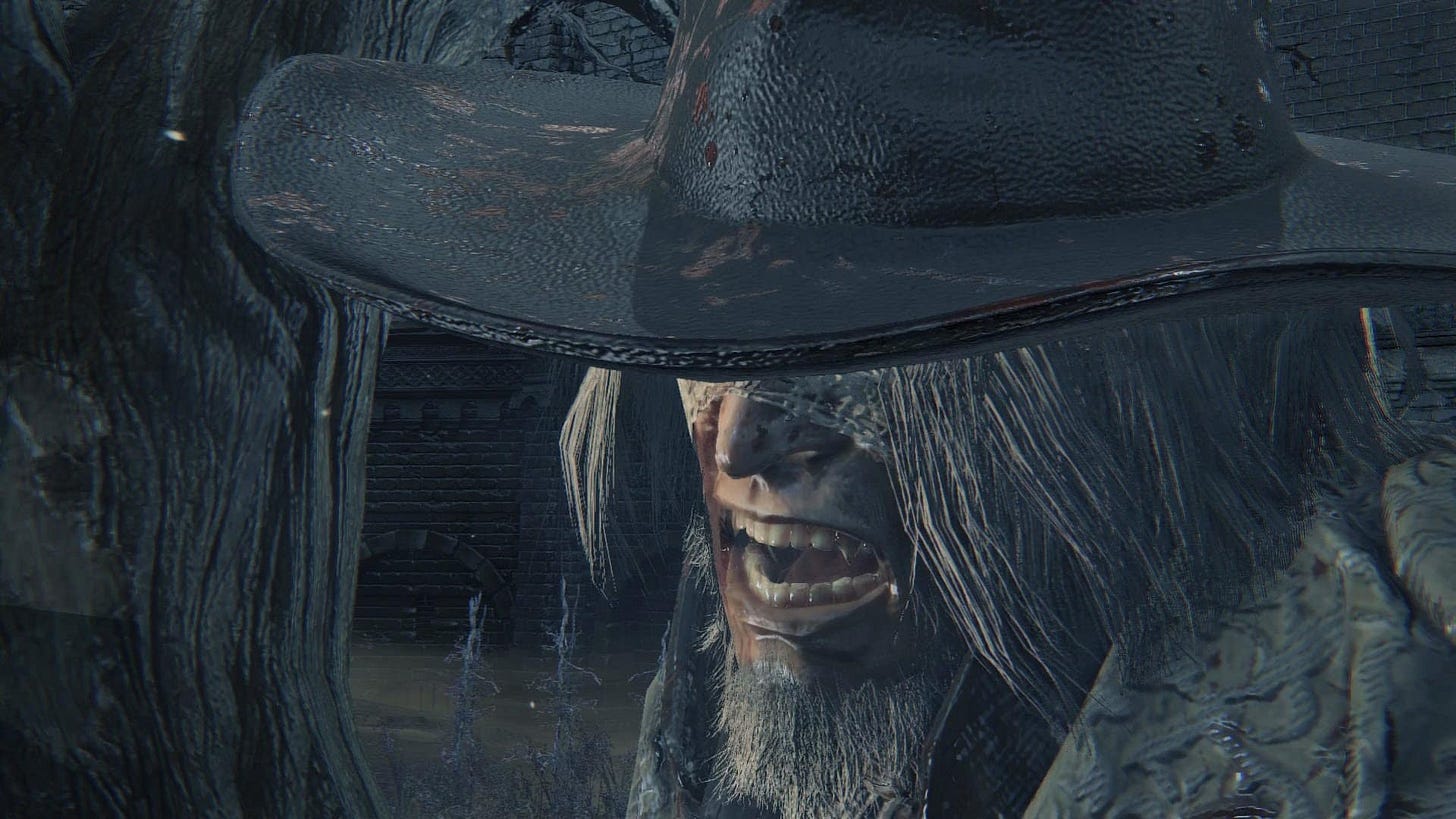
But those experiences are perfectly capable of remaining in the same games that have these accessibility settings. I definitely agree friction isn't a bad thing, but I think we, as developers, should give you, the player, options in how much friction you want to deal with.
Let's assume that the developer makes the easiest choice and just lets you decrease how much damage you take and increase how much damage you give, just like Nine Sols. With those choices how can you retain friction? Simple. It's all about the numbers.
The developer is welcome to provide the ability to make it trivial if they want but if they want that friction I think all they have to do is mess with those numbers. For instance, in Silksong, I believe you should be able to make all enemies do 1 damage and you should be able to double how much damage you do, maybe triple but in order to keep the friction double would be more "balanced" and that's all about just having a limit of how much of those numbers you can change. The numbers are the limits on either side of the slider for these things (these could also allow you to make the game more difficult but that's another topic). Those settings don't remove the difficulty, they actually move the difficulty from being all about damage to it more being about mechanics and actual enemy design. I played Silksong with these settings modded in (mods that were made within a day after release showing that it obviously wouldn't have been hard for Team Cherry to add these options in). They didn't make the game super easy. I wasn't going in and destroying bosses in one hit (except some bosses in Act 3 where I directly cheated because I just couldn't handle fighting that boss one more time without breaking a controller) or defeating them first try. I was still having a difficult time. I still had that friction. Just...less of it. I still remember bosses, I still had moments of barely surviving, I still had to be worried about damage, I still had to deal with enemy attacks in unique ways and use my tools (even if I was completely unaware at the time of some of the really strong builds that exist). I just also didn't have to deal with more cheap deaths and more stressful exploration.
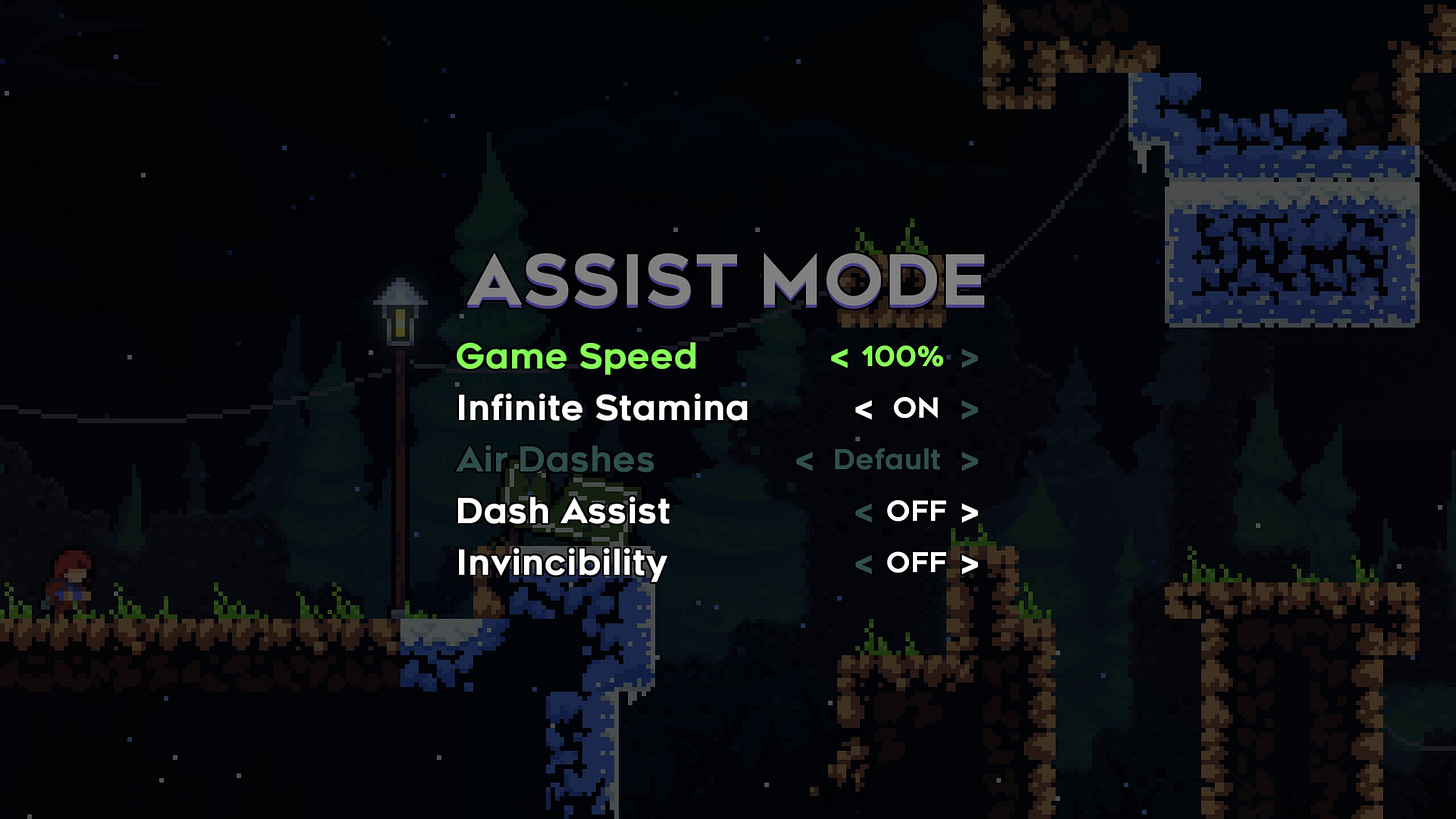
This is what I mean by easy modes or difficulty/accessibility settings. It's not about making the game simple as fuck, it's not about removing all challenge or friction, it's not about making it a completely different game (like making Disco Elysium into a witchy farming sim), it's not about giving you a "win button". It's about giving the players the option to choose how much friction they are comfortable with. That's not a bad thing.
We can do better
When many people use the phrase "Git Gud" (with other spellings as well) they mean it as a "just keep trying" thing. They're often trying to just say that you have to keep pushing until you get better. The problem is that this phrase doesn't actually try to help someone improve. There might be people who offer advice but they don't use the "git gud" framework, they are just actually helpful.
The problem is that the "git gud" people turn off new players from communities and from entire games. When you're trying to learn how to play the game by interacting with people who have already played it, being told to get good feels like an insult towards you. Feels absolutely useless like telling someone who's constantly getting hit in a game to just "not get hit".
Thus, I believe we should do away with that phrase. I believe that the phrase just has too many negative connotations to it nowadays. That using it as "a meme", which I have seen many many many people claim to be using it as, is just unhelpful and annoying.
So I must ask the gaming community at large to, instead of saying "git gud", be like the people among your community who actually offer advice for people struggling. Don't add the phrase in there as a joke, it's too negative, just offer advice. This will be better as a whole for the community so that it can grow with new people.
What's more, we shouldn't be taking developers vision for the initial release of the game as literal gospel. Sometimes developers create something that doesn't resonate in the way they wanted to so they change it in patches, or they find out that some people are getting stuck at certain bosses that gatekeep large sections of the game so they decide to make changes to help. Developers can do wrong, they're not some god who is all knowing and all wise and you must respect all the choices they made during development. Sometimes developers make dumb design decisions, that's just reality and shouldn't be ignored.
I'm a developer, I want people to point out problems with my game. Things that I could have done better. Legitimate critique, like criticizing the lack of accessibility options in hard games, is good. It can make you a better developer and, in the case of accessibility options, can open your eyes to how to have your games be more accessible for as many people as possible.
So how about we, as a gaming community, understand that even if a game is an amazing game, criticism is a good thing. Even if it might seem to contradict the supposed "vision" of the developers. It's the only way we can get better as devs.
Which also means that we as a gaming community have to understand that it's okay to have our favorite games criticized in the community that is for them, and that you shouldn't just hurl "git gud" at the people who are struggling and criticizing the game for not providing accessibility options to make the game somewhat easier. If they're having issues, just offer them advice. Stop being dicks and actually be helpful.
The Conclusion
At the end of the day I have a fundamental problem with not offering difficulty modes or accessibility settings that allow you to mess with difficulty. All games should because its good to allow more people to experience the game. But games don't need to make their normal mode easy, make that the "intended experience" that the elitists crave. Don't nerf that mode, that's not needed, just also allow some easier options so more people can play it.
I know game balancing is hard. I'm dealing with balancing my own game right now so that it's not too hard and not too easy. But accessibility settings or difficulty based easy modes don't have to be super "balanced". They can allow people to play an unbalanced or less balanced experience because that's fun to do sometimes. Balance isn't always needed, sometimes breaking things and doing things the developers didn't balance for is the best part of playing games (looking directly and pointedly at Destiny 2).
The above video isn’t an intended way to beat a very tough boss in Destiny 2's Last Wish raid, but it’s certainly a fun way!
Players should feel empowered when playing games. That's not just in gameplay but in settings for the game as a whole. This should be standard for all games and it mostly is. There's only a small amount of games that have refused to provide easier modes, and those could still easily have them. They're also often from developers who could easily afford to spend time working on an easy mode if they cared to.
Basically, fuck "git gud". Difficulty modes and accessibility settings/sliders to modify the difficulty are healthy for the industry and for literally all games. If you're making a game, spend time adding these capabilities. Don't just ignore a massive audience that actually wants to play your game. Games are art and art is supposed to be as accessible for everyone as possible.
Meow,
Cat


